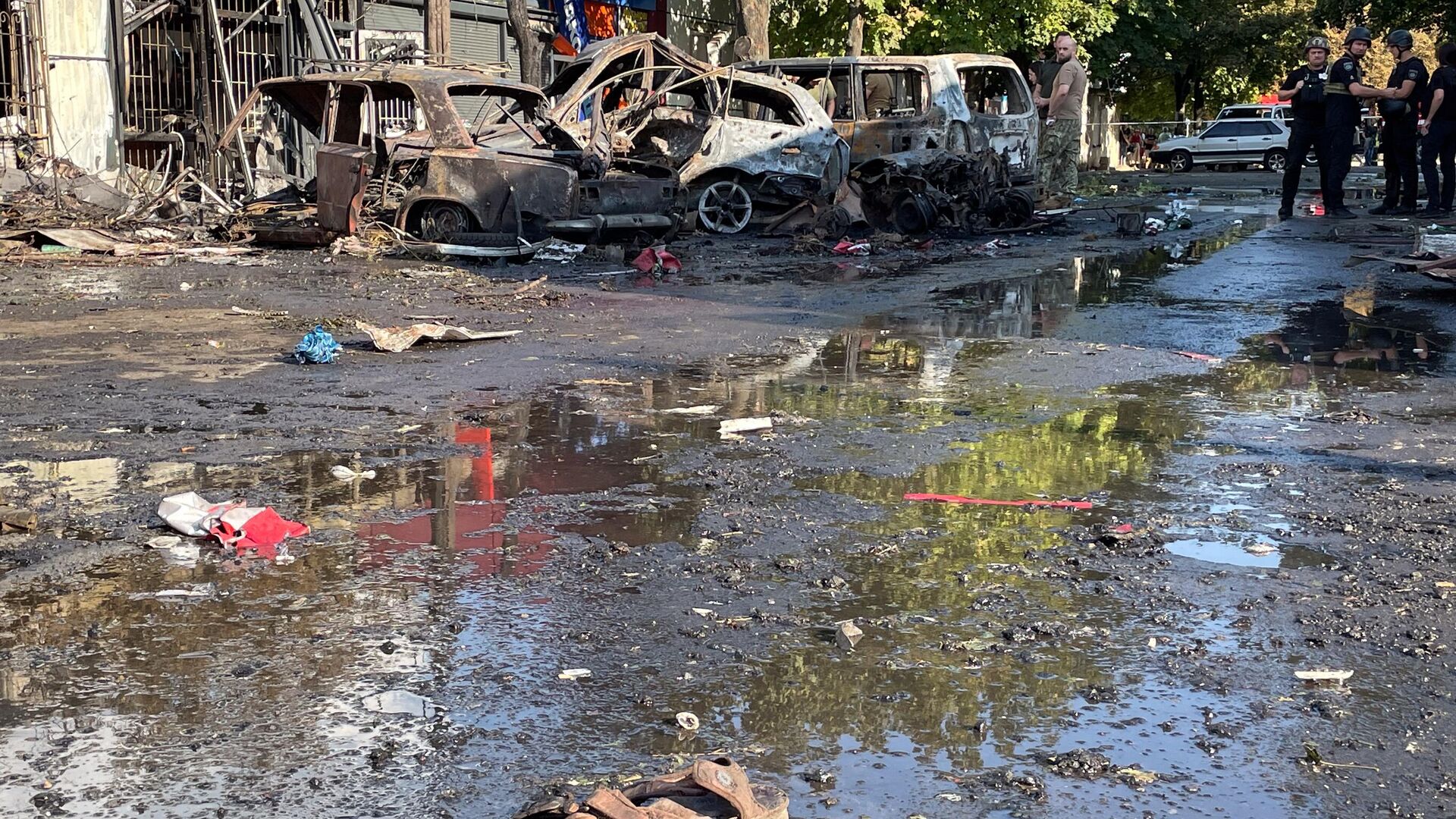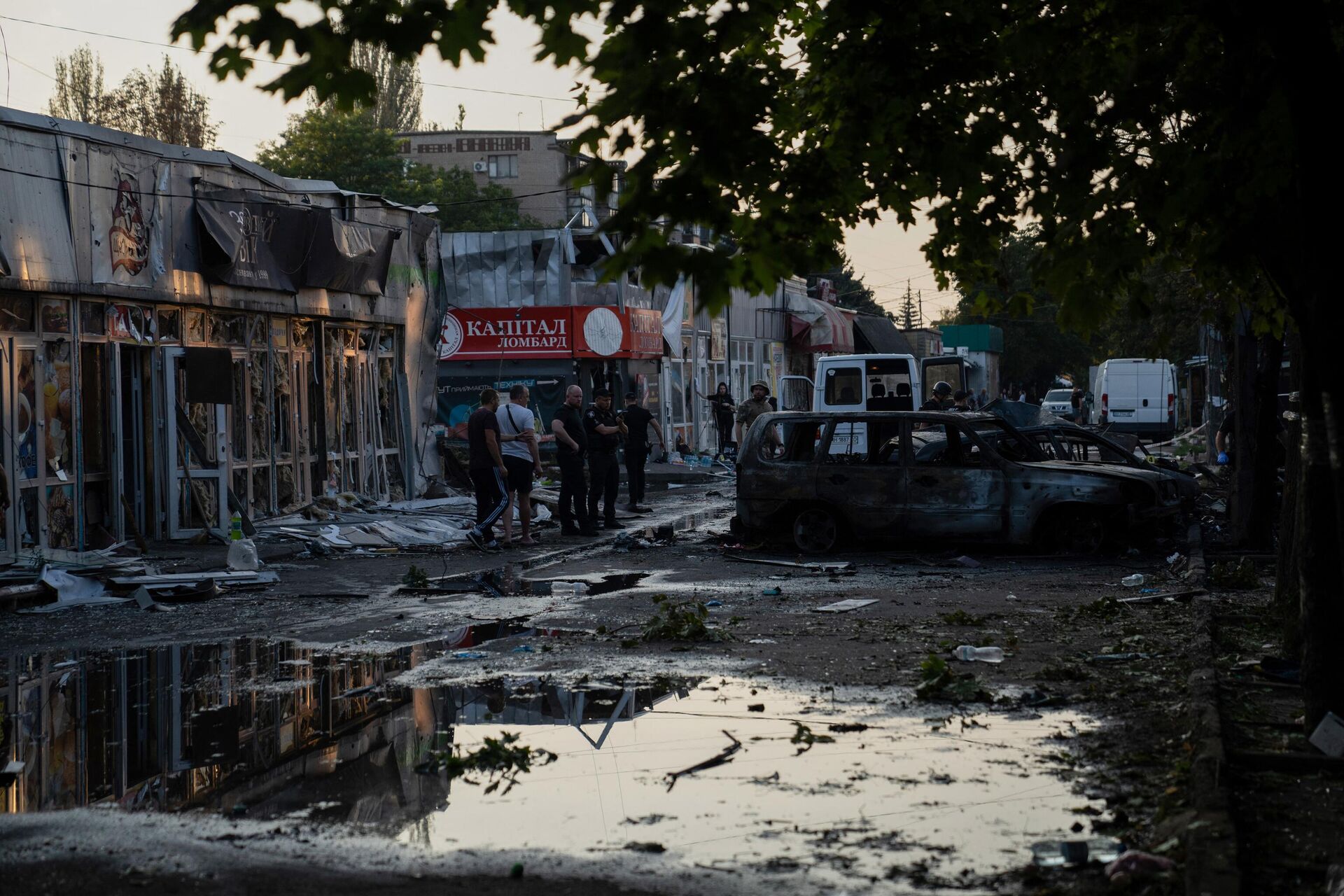https://en.sputniknews.africa/20230919/1062214098.html
DPR Market Tragedy Was Caused by Ukrainian Buk Missile, US Media Report Confirms
DPR Market Tragedy Was Caused by Ukrainian Buk Missile, US Media Report Confirms
Sputnik Africa
A US media article has revealed a thorough analysis that refutes vehement claims made by Ukraine's President a few weeks ago as Volodymyr Zelensky makes his... 19.09.2023, Sputnik Africa
2023-09-19T10:30+0200
2023-09-19T10:30+0200
2023-09-19T13:25+0200
russia's special operation in ukraine
russia
antony blinken
volodymyr zelensky
united states (us)
kiev
united nations (un)
ukraine
s-300 system
terrorist attack
https://cdn1.img.sputniknews.africa/img/07e7/09/13/1062214276_0:257:2730:1793_1920x0_80_0_0_61d06e02e22605358edd26d75ced7b4c.jpg
Ukrainian President Zelensky’s visit to the US to attend the UN General Assembly meeting in New York, visit the White House, and meet with congressional leaders, comes against a sobering backdrop. Ukraine’s much-hyped counteroffensive has been stuttering, while skepticism is mounting over endlessly propping up the Kiev regime among some Republican lawmakers.On the eve of Zelensky’s arrival, the New York Times published an investigative piece into a missile strike on a marketplace in the town of Konstantinovka, in the Donetsk People's Republic (DPR), that occurred earlier in the month.The strike on September 6 had killed 15 people and left over 30 people wounded, according to Ukrainian officials. Zelensky was quick to describe it as a "Russian" attack on "a regular market and shops,” with numerous Western media outlets parroting the claim and Ukrainian Prime Minister Denys Shmyhal vowing "fair retribution" for it. The strike occurred on the same day when US Secretary of State Antony Blinken made a surprise visit to Ukraine, announcing millions in new aid to Kiev.However, evidence suggests it was a Ukrainian missile released from a Buk surface-to-air system that caused the market tragedy, as per the US report. A long hard look at eyewitness accounts, social media posts, analysis of video and weapon fragments, along with satellite imagery, “strongly suggests the catastrophic strike was the result of an errant Ukrainian air defense missile fired by a Buk launch system,” write the journalists.Ukraine’s authorities had initially tried “to prevent journalists with the Times from accessing the missile debris and impact area in the strike’s immediate aftermath,” according to the report. However, they subsequently managed to reach the scene of the strike, talk to witnesses, and gather fragments of the projectile itself.Ukrainian artillery fire had been reported in the area, according to a local Telegram group, minutes before the strike on the marketplace, the media report underscored. The missile strike on Konstantinovka came from the direction of Ukrainian-held territory, not from Russian lines, according to security camera footage seen by the journalists. Furthermore, they claim that “at least four pedestrians appear to simultaneously turn their heads toward the incoming sound” - in the direction of Ukrainian-held territory - when the missile approached. A reflection of the missile itself, coming in from the northwest, is visible in the cited footage, passing over parked cars.Further analysis shows that the crater and point of detonation are also “consistent” with a missile traveling from the northwest. According to the media outlet’s reporters who were in the nearby town of Druzhkovka at the time of the missile strike on Konstantinovka, minutes before the attack, Ukraine’s military had launched two surface-to-air missiles toward the Russian front line. The Ukrainian missile launches were also purportedly mentioned by the residents of Druzhkovka at the specified time in a local social media group. Witnesses that reporters interviewed also confirmed they saw the missiles being fired, and traveling in the direction of Konstantinovka. Missiles had been launched from fields outside Druzhkovka, another witness stated, adding that it had been used by the Ukrainian military to station air defense systems. After reporters themselves visited the site in question, they “saw indications that it had recently been used by the military, including trenches, trash pits and wide tracks consistent with a large military vehicle.” Satellite imagery showed fresh scorch marks around the trenches on the day of the missile strike, in an indication the area could have been used to launch missiles, the investigation revealed.While the Ukrainian authorities have claimed that Russia had fired a missile from an S-300 air defense system at Konstantinovka, such a missile has a “different warhead” from the one that exploded in the market on September 6, the report pointed out. It added that the measurements of the holes in the facades of the buildings closest to the strike are “consistent in size and shape” with a 9M38 missile, fired by a Buk antiaircraft vehicle, used by Ukraine. The same conclusions were reportedly made by independent military bomb-disposal experts: damage at the missile strike site in Konstantinovka was “most consistent with an 9M38.”The Kiev regime staged a false flag in the DPR's Konstantinovka based on the same scheme as in Bucha, Russian Ambassador to the United Nations Vassily Nebenzia said at a meeting of the UN Security Council on September 8. Referring to the strike on the town in the part of the DPR controlled by Ukraine's forces, he called it a terrible tragedy, adding:Western mainstream media has been eager to echo the Kiev regime’s falsehoods, such as accusing Russia of deliberately striking civilian targets. The developments in the city of Kramatorsk, in the Donetsk People's Republic (DPR), and are another case in point.As for Bucha, the Ukrainian authorities and Western media had spread gruesome footage purportedly showing murdered civilians lying along a road in the suburb of Kiev, citing it as evidence of “Russian war crimes.” Moscow dismissed the footage as a false flag provocation, pointing out that the bodies appeared days after Russian troops had withdrawn.Russia has repeatedly reiterated that its armed forces do not attack civilian facilities.
russia
united states (us)
kiev
ukraine
Sputnik Africa
feedback@sputniknews.com
+74956456601
MIA „Rossiya Segodnya“
2023
News
en_EN
Sputnik Africa
feedback@sputniknews.com
+74956456601
MIA „Rossiya Segodnya“
Sputnik Africa
feedback@sputniknews.com
+74956456601
MIA „Rossiya Segodnya“
russia, antony blinken, volodymyr zelensky, united states (us), kiev, united nations (un), ukraine, s-300 system, terrorist attack, attack
russia, antony blinken, volodymyr zelensky, united states (us), kiev, united nations (un), ukraine, s-300 system, terrorist attack, attack
DPR Market Tragedy Was Caused by Ukrainian Buk Missile, US Media Report Confirms
10:30 19.09.2023 (Updated: 13:25 19.09.2023) A US media article has revealed a thorough analysis that refutes vehement claims made by Ukraine's President a few weeks ago as Volodymyr Zelensky makes his second trip to the US to request additional aid.
Ukrainian President Zelensky’s visit to the US to attend the UN General Assembly meeting in New York, visit the White House, and meet with congressional leaders, comes against a sobering backdrop. Ukraine’s much-hyped
counteroffensive has been stuttering, while
skepticism is mounting over endlessly propping up the Kiev regime among some Republican lawmakers.
On the eve of Zelensky’s arrival, the New York Times published an investigative piece into a missile strike on a marketplace in the town of Konstantinovka, in the Donetsk People's Republic (DPR), that occurred earlier in the month.
The strike on September 6 had killed 15 people and left over 30 people wounded, according to Ukrainian officials. Zelensky was quick to describe it as a "Russian" attack on "a
regular market and shops,” with numerous Western media outlets parroting the claim and Ukrainian Prime Minister Denys Shmyhal vowing "
fair retribution" for it. The strike occurred on the same day when US Secretary of State Antony Blinken
made a surprise visit to Ukraine, announcing millions in new aid to Kiev.
However, evidence suggests it was a Ukrainian missile released from a
Buk surface-to-air system that caused the market tragedy, as per the
US report. A long hard look at eyewitness accounts, social media posts, analysis of video and weapon fragments, along with satellite imagery, “
strongly suggests the catastrophic strike was the result of an errant Ukrainian air defense missile fired by a Buk launch system,” write the journalists.
Ukraine’s authorities had initially tried “to prevent journalists with the Times from accessing the missile debris and impact area in the strike’s immediate aftermath,” according to the report. However, they subsequently managed to reach the scene of the strike, talk to witnesses, and gather fragments of the projectile itself.
Ukrainian artillery fire had been reported in the area, according to a local Telegram group, minutes before the strike on the marketplace, the media report underscored. The missile strike on Konstantinovka came from the direction of Ukrainian-held territory, not from Russian lines, according to security camera footage seen by the journalists. Furthermore, they claim that “at least four pedestrians appear to simultaneously turn their heads toward the incoming sound” - in the direction of Ukrainian-held territory - when the missile approached. A reflection of the missile itself, coming in from the northwest, is visible in the cited footage, passing over parked cars.
Further analysis shows that the crater and point of detonation are also “consistent” with a missile traveling from the northwest. According to the media outlet’s reporters who were in the nearby town of Druzhkovka at the time of the missile strike on Konstantinovka, minutes before the attack, Ukraine’s military had launched two surface-to-air missiles toward the Russian front line.
The Ukrainian missile launches were also purportedly mentioned by the residents of Druzhkovka at the specified time in a local social media group. Witnesses that reporters interviewed also confirmed they saw the missiles being fired, and traveling in the direction of Konstantinovka.
“The timing of these launches is consistent with the time frame for the missile that struck the market in Kostiantyn[o]vka, around 2:04 p.m. [local time]” say the outlet.
Missiles had been launched from fields outside Druzhkovka, another witness stated, adding that it had been used by the Ukrainian military to station air defense systems. After reporters themselves visited the site in question, they “saw indications that it had recently been used by the military, including trenches, trash pits and wide tracks consistent with a large military vehicle.” Satellite imagery showed fresh scorch marks around the trenches on the day of the missile strike, in an indication the area could have been used to launch missiles, the investigation revealed.
While the Ukrainian authorities have claimed that Russia had fired a missile from an S-300 air defense system at Konstantinovka, such a missile has a “different warhead” from the one that exploded in the market on September 6, the report pointed out. It added that the measurements of the holes in the facades of the buildings closest to the strike are “consistent in size and shape” with a 9M38 missile, fired by a Buk antiaircraft vehicle, used by Ukraine. The same conclusions were reportedly made by independent military bomb-disposal experts: damage at the missile strike site in Konstantinovka was “most consistent with an 9M38.”
The Kiev regime staged a false flag in the DPR's Konstantinovka based on the same scheme as in
Bucha, Russian Ambassador to the United Nations
Vassily Nebenzia said at a meeting of the UN Security Council on September 8. Referring to the strike on the town in the part of the DPR controlled by Ukraine's forces, he called it a terrible tragedy, adding:
“It's just that, we are sure you'll soon forget and cover up this incident, as in the case of the attack on Kramatorsk in April last year.”
Western mainstream media has been eager to echo the Kiev regime’s falsehoods, such as accusing Russia of deliberately striking civilian targets. The developments in the city of Kramatorsk, in the Donetsk People's Republic (DPR), and are another case in point.
As for Bucha, the Ukrainian authorities and Western media had spread gruesome footage purportedly showing murdered civilians lying along a road in the suburb of Kiev, citing it as evidence of “Russian war crimes.” Moscow dismissed the footage as a false flag provocation, pointing out that the bodies appeared days after Russian troops had withdrawn.
Russia has repeatedly reiterated that its armed forces do not attack civilian facilities.



